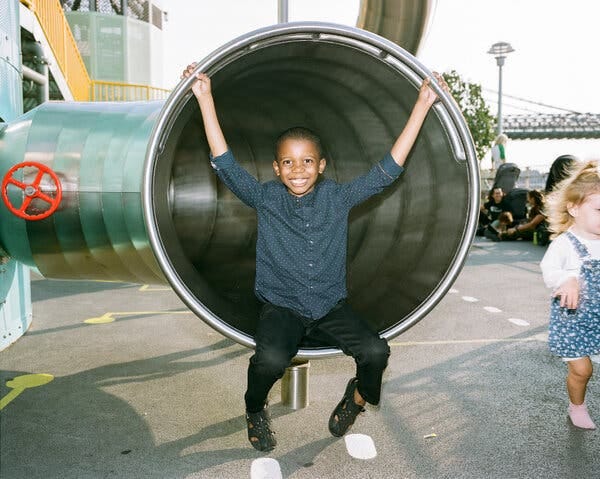Edition #123: Giving Up On Good
Plus, no sex for you, the DARE program is back, and a delicious recipe for cookies
A Note From the Editor
It has been said that as children we are the most genuine versions of ourselves. Though childhood inevitably creates some scars—we develop certain behaviors in relation to our environment and to how we were parented, picking up on the traits we were rewarded for and amplifying them—children are generally purer than adults, unencumbered by large-scale expectations, blissfully unaware. It is why children can play freely, use their imaginations, and enact less harsh judgments on others.
If we are most genuine as children, then I am not good—I was not good. As a child, I was silly, loud, and abrasive. At my worst I was a bully, forcing classmates to do my homework, excluding the new girl from my sleepover, being dubbed as the kid you might not want your kids to be friends with. “She’s a bad influence,” one girl’s mother said about me to another girl’s mother after I caused a stir at middle school movie night. We were 12 and I was restless and I didn’t want to watch the movie. I poked fun at the small rule books the movie night host printed out and read aloud—we weren’t supposed to speak during the movie, we could only have two pieces of candy each, we couldn't say any four-letter words (which, I presume, was meant to keep us from cursing). When, many years later, I discovered the host’s mother had warned another mother about me, I understood her reasoning. I wasn’t, by definition, a textbook “good” kid.
I wonder—when you hear the word “good” as it relates to a person, what comes to mind? I think of the classic “he’s a good guy,” qualifier, usually used in a romantic sense to indicate a man is traditionally virtuous—faithful, not abusive, possibly kind. As in, why are you breaking up with him, he’s such a good guy! Or of being called a “good girl,” which is an inherently infantilizing compliment signifying obedience. As it is, you are acting the way I want you to act, good girl! One of my favorite poems, Wild Geese by Mary Oliver, starts like this:
You do not have to be good.
You do not have to walk on your knees
For a hundred miles through the desert repenting. I read the poem for the first time when a friend sent it to me during a particularly trying period. Tears sprung to my eyes upon the first line. I read it twice, three times: You do not have to be good. You do not have to be good. What a simple gift; permission. And acknowledgment for self-inflicted repentance. You do not have to be good.
Early adulthood, for me, has been a lesson in repentance. I was not so well-liked as a child because of my attitude, my lack of goodness, so I eventually learned what it would take to become well-liked. I began to shed some of my bad behaviors in high school and by college, they were mostly all gone; I was decently liked but not deeply known. An unrealized obsession with being well-liked began to grow in me. I wanted to be everyone’s favorite. When I met new people, at a party or in the wild, I wanted them to leave saying, “Wow, I really liked her.” I imagined people having these conversations about me when I wasn’t around. I imagined leaving a pristine impression on everyone I encountered. Doing so required me to shed certain parts of myself while amplifying others. I wrote “chameleon” in my notebooks several times over the years as I identified my tendency to change color based on those around me. Getting people to like you isn’t so hard when you do not counter their opinions too harshly, when you learn to bite your tongue to the point of drawing blood, when you offer endless support for others and ask little in return, when you lock vital pieces of yourself away for fear that their reveal will detract from your precious popularity.
In the midst of it, of being good and being well-liked, I developed a sense of blindness to my own tastes and preferences. I once told my sister that I felt terrible after hanging out with a guy friend of mine. I told her more about the night, the two of us drinking and drinking when I knew I should stop drinking, him asking whether I was afraid to turn 30 because it would mean I would become exponentially less desirable, him saying he was going to be like Tiger Woods, unmarried until 40 because men age like wine. Without skipping a beat, my sister said, “You don’t have to be friends with him, you know.” Somehow I hadn’t realized the most obvious option. I was so preoccupied with getting him to like me. You do not have to be good.
Good is rule-following, accepting, politeness, virtue, smiling sweetly when someone passes you on the street and says you have a pretty smile or a nice ass, seeking the good in others when they do not extend you the same grace, forgiving, taking the high road. The opposite of good, then, is breaking rules, prodding, being rude or abrasive, vices, telling a catcaller to go fuck themselves, admitting that you just don’t like someone and being OK with it, holding grudges, not striving to be the bigger person but letting yourself stew in pettiness on occasion. If I had to gender goodness, goodness would be a woman—trying to please, trying to soothe the tension, trying to bring people together, trying to make everyone happy, often at the expense of her own wellbeing. She would be a good girl who would blossom into a good woman.
Goodness is step one, the caterpillar before it retreats into its cocoon and emerges as step two, morality. Morality has always been a great American obsession–just look at Benjamin Franklin’s 13 virtues needed for moral perfection, in which the Founding Father created a complex tracking system intended to ensure he would develop an “instinctive ability” to make the “right choice” every time. Franklin’s exercise is often regarded as the basis for the modern self-help industry—an $11.3 billion industry in America in 2021, for the record. The conditioning of right and wrong, black and white, good and evil side has been an omnipresent force on American soil since 1776 and likely long before then. We are supposed to strive for goodness, even when goodness is not clearly defined in our minds. Even when goodness harms others or harms ourselves.
Not so long ago, I was in my first destructive relationship. It was the first time I was called names by someone who claimed to love me, someone who was such a skilled chameleon that their ability to transform acted as an unwanted, albeit useful mirror for my own tendency to do so. They called me judgemental, a flip-flopper, an ice queen—a skillful trick of using the insecurities I’d expressed as insults. The opposite of those traits would be accepting, decisive, warm. It becomes clear, in retrospect, what they were trying to tell me by way of manipulation— you’re not being good. Be a good girl. You’d be better if you were a good and not such an opinionated bitch.
Over the course of the past few years, and especially as of late, I have lost interest in being good. I am more interested in being myself. This happened largely in part because I have spent an ever-increasing amount of time writing and writing requires truth. I cannot conceal myself when I write these essays each week; there is nothing but me on the page. Writing has a way of amplifying the very core of a person whether they like it or not.
The slow shedding of the goodness I worked so hard to construct in adulthood has not come without consequences. As I began to reveal myself over the years, I felt the quiet judgment of a few people I had always loved—a judgment that, as a matter of course, bubbled to the surface and caused a quiet, relationship-ending conflict. For a while I was unable to get over it, unable to think about the situation without feeling the sharp sting of rejection. It seemed the more I grew into myself, the more I found my voice and felt comfortable expressing my beliefs, the less they liked me. Which had to mean, I eventually surmised, that they genuinely did not like the person I was, for I had never felt more comfortable in my own skin. When the initial wound of the situation began to scab over, I began to find peace in it—because when the only thing you can do to win someone over is to conceal who you are, you have to begin to question why you want to win them over in the first place. They don’t have to like you, I reminded myself often, the times when losing them kept me up at night. You don’t have to be for everyone.
Over time, things have become much clear. I do not have to be for everyone and, finally, I can see not everyone has to be for me. I’m no longer making mountains out of men. I’m accepting that being well-liked doesn’t come with a first-place trophy, nor does it make me feel any closer to myself. I’m allowing myself the space to evaluate people honestly, to actively decide who I want to have in my life and who I want to pour my energy into. I’m learning that the opposite of good isn’t bad but, as Courtney Martin so eloquently puts it, liberation. I’m noticing my judgments, when they arise, and not chastising myself for being judgemental but asking questions—what does this signify about who you are, about your insecurities, about what you value?
You do not have to be good.
You do not have to walk on your knees
For a hundred miles through the desert repenting.
You only have to let the soft animal of your body
love what it loves.
Tell me about despair, yours, and I will tell you mine.
Meanwhile, the world goes on. Cheers, my dears, and as always, thank you for reading. I’m going to see Don’t Worry, Darling tomorrow—the press drama sucked me in—and the rest of the weekend will be spent at a bonfire, trying a new breakfast spot with friends, and packing for a quick trip to Mexico next week. Today’s the first day of the best season of all (autumn, no one will change my mind), so I hope you find a small way to celebrate it this weekend.
Three Pieces of Content Worth Consuming
No Sex For You. If there’s one thing you read from today’s edition, make it this. When an author can write with a crass sense of humor but still manage to make several intelligent points—that’s skill. This one’s about the Metaverse, the hellish digital world Mark Zuckerburg is trying to create and eventually force everyone into, a place that Meta says will have Disney-like security. The piece focuses on the sexless nature of the strangely childlike digital world, pointing out all of the hypocrisy of Facebook being so anti-sex—the platform that was initially created to rate women’s hotness on college campuses, the platform that spews misinformation like it’s their job, and the platform that profits off of selling user data. Give it a read.
“The sample animation Meta released suggests that it may be possible to someday customize yourself into a giant robot, if you like, but only a cute, funny robot, not a spiky, scary one. The robot sits in a conference room and does his work because he is an adult.”
Please, God, Help Me Stop Missing Her. One of my favorite modern Love essays to date. Every time I read one, I'm struck by the simple, universal pains of love, the way it offers so much promise, it offers us the entire world, but how it also practically guarantees our imminent demise. So much pain, but great growth from the pain. This beautiful essay chronicles an orthodox Jewish woman in New York and a decades-old love that follows her throughout the years.
The DARE Program Is Back In Some School Districts. If you grew up in the’80s or ’90s then you’re familiar with DARE, the government-funded anti-drug program that terrorized elementary school students into thinking everyone who had ever touched a drug was a scary, dangerous person—and don’t forget the signature red shirts! One thing I didn’t know about DARE before reading this is that the friendly police officers who ran the programs would often gain the trust of the children, resulting in the children confessing thier parents were using drugs—even small quantities of marijuana. The officers then had a reason to go search their homes and arrest those parents, using information thier children were essentially tricked into sharing.
Perhaps You Should… Bake Your Troubles Away
Summer is good for many things but baking is not one of them—especially not when you live in a hot, tiny city apartment whose temperature is easily overtaken by the heat of the stove. But summer’s over, baby, and autumn is here! As such, I baked these cookies for book club this week and they were so, so delicious—even better the next day. Double the recipe, watch the amount of butter that you have after browning to ensure it isn’t too much, and add pumpkin pie spice to the sugar mixture you roll the cookies in at the end. Also, I cannot suggest this book highly enough—our last book club pick. It’s beautifully written, short, and packs a punch. An essential piece of reading, especially if you’ve never had the pleasure of reading James Baldwin before.
Other fall baking ideas include this cake, which I made two years ago and my friend still hasn’t stopped talking about (also a good excuse to go apple picking) or this one, which is easy to make, quick, and delicious.
**Bonus Content** (More on Corn Kid)
You know him, you love him, the corn kid! His real name is Tariq and I found this New York Times profile about him to be an endearing, light read. Also, one of the only articles whose comments are practically exclusively positive. Such a nice change!
Also watched this about 100 times, big-time goals, salivating over these looks, burning this little candle, channeling this energy.
A Quote From A Book You Should Read:
“Small children are great accepters. They don’t understand shame, or the need to hide things.”
-The Shining by Stephen King
This newsletter is best served with a side of conversation, so drop your opinions, reflections, and thoughts in the comments below and let’s get to talking.
Or, share the most thought-provoking piece from today’s edition with someone you love, then call them up to discuss, debate, and percolate. As a wise woman once said, “Great minds discuss ideas.







Loved this. You are such a good writer but possibly not a good historian. Ben Franklin was never President.
I'm sorry that your digging unearths ugly creatures that scream at their first exposure to sunlight. That must be difficult, and may also feel less than wonderful. But perhaps beauty is in the eye of the beholder, and what you discover by digging into yourself is actually very pleasant and exciting to behold, particularly when viewed from a well-chosen viewpoint.